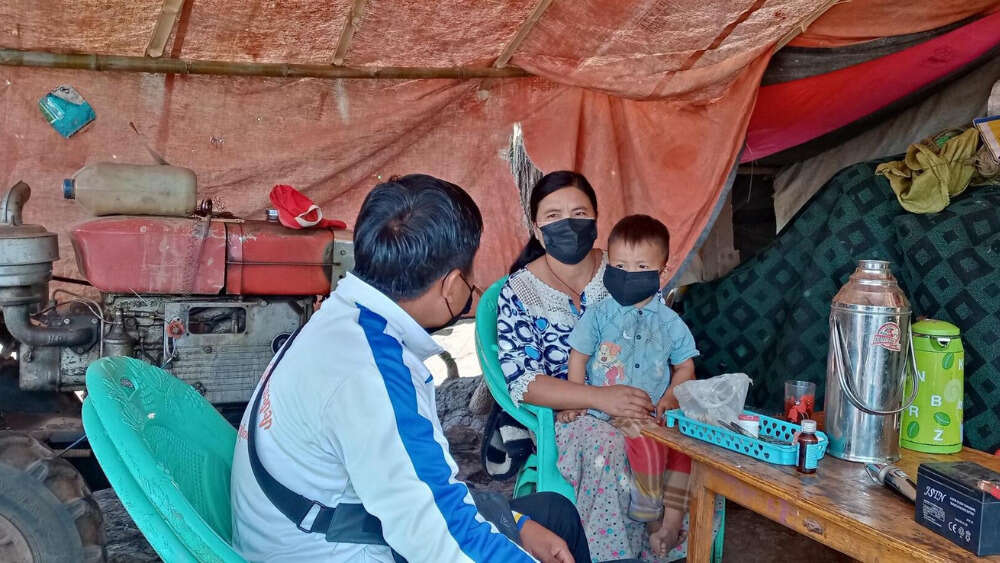Myanmar fieldworker: 'For the first time in my life, I am flooded with anxious thoughts'
Kyaw Kyaw*, development field officer, World Vision Myanmar
My days, before the socio-political crisis, started with a morning prayer. As a humanitarian worker, I felt a sense of satisfaction when I visited communities, liaised with village development committees and volunteers, distributed relief items and ensured children felt safe and nurtured.
But the global pandemic hit us. It brought disruptions and barriers. The socio-economic impact of COVID-19 triggered inflation, closure of schools, food and financial insecurity. We were reaching some normalcy when suddenly the unrest started. The challenges brought by COVID were compounded by the conflict. The conflict has severely affected the daily lives of people and their livelihoods, many are displaced and living in camps. Lack of access to health and security services has further worsened the situation.
Now, when I wake up, for the first time in my life, I am flooded with anxious thoughts. As the fighting intensifies, our new reality is the sound of gunshots, news of lives lost, destruction to property.
Every day, the challenges triggered by the conflict become increasingly complex, the biggest being the effect on children. They have not been able to go to school for about two years. Access to the COVID-19 vaccine is limited. Even if displaced people contract COVID-19, they are reluctant to seek treatment at a hospital because either they cannot afford it or they fear being killed, detained and their property being set on fire. The panic brought by the mysterious COVID-19 virus has been replaced by the fear and uncertainty of conflict.
Community members don’t dare to stay at home anymore. Fearing for their lives, they flee, leaving their homes behind. I see people moving far away from the conflict to safer areas in the hope of keeping their loved ones safe. For me, the safety of our community members is of paramount importance. Narrowly escaping fighting, airstrikes and landmines, villagers and their families find safer places to relocate.
“They are reluctant to seek treatment at a hospital because either they cannot afford it or they fear being killed, detained and their property being set on fire.”
Even in the camps, there is a sense of fear among the children and their families. With schools closed and no homes to go to, children are disproportionately affected. They have no safe place to go where they feel protected. Their loved ones being killed, running from gunfire and bombs have become their new reality. Children are showing signs of distress. Whenever they hear loud sounds, it reminds them of fighting and killing.
I am working with camp committee members to assess the immediate needs of the displaced population, and when they receive relief assistance, like food, shelter, warm clothes, cash and education support for children, from us and other partner organisations, it is the most rewarding moment that melts my worries and insecurities away.
One day as I was walking back home, I saw two 12-year-old children digging a hole in the ground. I stopped to observe what they were doing. They kept on digging deeper and deeper. When I asked them what they were doing, they said they were trying to build a shelter for their family so that they are protected from airstrikes and bombs. Amid such a challenging situation, the children were trying to find solutions to keep themselves safe with the limited resources they had at their disposal. Those children taught me a lesson of what resilience looks like.
We need to do our part to ensure the children displaced by conflict feel safe. That is why the work aid workers and charities do to support the oppressed and the vulnerable really matters. I believe that when we all work together to help vulnerable children and their families, they become more resilient and develop the ability to bounce back stronger. That’s why I decided to work for an organisation like World Vision that works in some of the world’s toughest places, to serve vulnerable children and their families.
I want to see these displaced children develop and grow up with access to sufficient nutrition, health care, education, physical and mental security, love and protection. I am proud that World Vision, is serving the most vulnerable children. But we cannot do this alone. The next generation is counting on us to protect their future. It is my sincere prayer that peace will be restored in Myanmar, and children begin the healing process. It takes a world to end the violence against children in Myanmar.
*name changed to protect the identity of the staff
Go here to learn more about how World Vision’s is working with Myanmares who have been displaced.
Email This Story
Why not send this to a friend?


